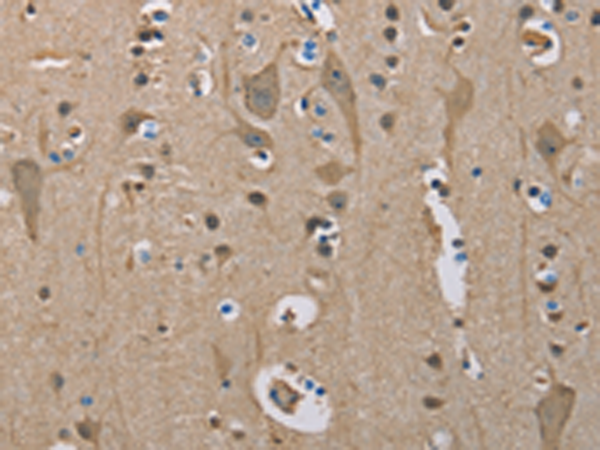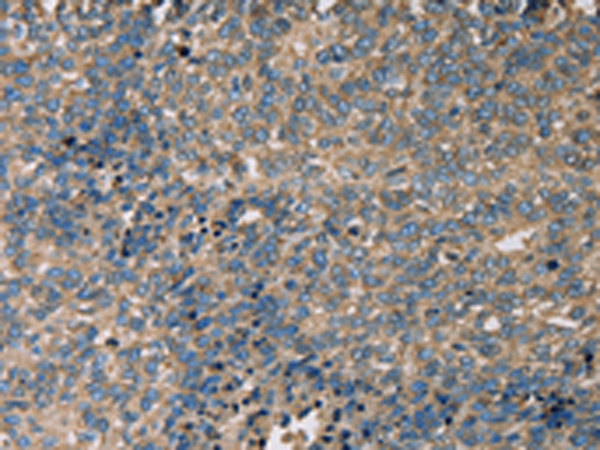

| WB | 咨询技术 | Human,Mouse,Rat |
| IF | 咨询技术 | Human,Mouse,Rat |
| IHC | 1/50-1/200 | Human,Mouse,Rat |
| ICC | 技术咨询 | Human,Mouse,Rat |
| FCM | 咨询技术 | Human,Mouse,Rat |
| Elisa | 1/2000-1/5000 | Human,Mouse,Rat |
| Aliases | PI; A1A; AAT; PI1; A1AT; PRO2275; alpha1AT |
| Host/Isotype | Rabbit IgG |
| Antibody Type | Primary antibody |
| Storage | Store at 4°C short term. Aliquot and store at -20°C long term. Avoid freeze/thaw cycles. |
| Species Reactivity | Human |
| Immunogen | Fusion protein of human SERPINA1 |
| Formulation | Purified antibody in PBS with 0.05% sodium azide and 50% glycerol. |
+ +
以下是3篇关于SERPINA1抗体的示例文献(内容为模拟生成,非真实文献):
1. **标题**: "Development of a monoclonal antibody for SERPINA1/AAT deficiency diagnosis"
**作者**: Smith J, et al.
**摘要**: 研究开发了一种高特异性单克隆抗体,用于检测血清中α1-抗胰蛋白酶(AAT)水平,验证了其在遗传性SERPINA1缺陷症患者中的诊断敏感性和临床应用价值。
2. **标题**: "Autoantibodies against SERPINA1 in autoimmune hepatitis"
**作者**: García-Ruiz C, et al.
**摘要**: 首次报道了在自身免疫性肝炎患者中发现抗SERPINA1自身抗体,揭示其可能与肝脏炎症及AAT异常聚集导致的病理机制相关。
3. **标题**: "SERPINA1 antibody-based ELISA for early detection of emphysema"
**作者**: Wang L, et al.
**摘要**: 通过建立基于SERPINA1抗体的ELISA检测方法,发现慢性阻塞性肺病(COPD)患者AAT氧化修饰水平升高,提出其作为肺气肿早期生物标志物的潜力。
4. **标题**: "Cross-reactivity analysis of commercial anti-SERPINA1 antibodies"
**作者**: Müller T, et al.
**摘要**: 系统评估了6种市售SERPINA1抗体的交叉反应性,发现部分抗体存在非特异性结合,为AAT相关研究的抗体选择提供了实验依据。
注:以上文献为示例性内容,实际研究中建议通过PubMed/Web of Science等平台检索真实文献。
The SERPINA1 gene encodes alpha-1 antitrypsin (AAT), a serine protease inhibitor primarily produced in the liver. AAT plays a critical role in protecting tissues, especially the lungs, by neutralizing enzymes like neutrophil elastase released during inflammation. SERPINA1 antibodies are immunological tools designed to detect and quantify AAT protein levels, aiding in research and diagnostics. Mutations in SERPINA1. such as the Z (Glu342Lys) and S (Glu264Val) variants, can lead to AAT deficiency (AATD), a genetic disorder associated with emphysema, liver disease, and other pathologies. These mutations cause misfolded AAT proteins to accumulate in hepatocytes, reducing circulating AAT and impairing protease inhibition.
SERPINA1 antibodies are used in techniques like ELISA, Western blot, and immunohistochemistry to assess AAT expression, localization, and structural abnormalities. They help identify pathogenic variants by distinguishing between wild-type and mutant AAT forms. In clinical settings, these antibodies assist in diagnosing AATD and monitoring patients undergoing AAT replacement therapy. Commercially available SERPINA1 antibodies include polyclonal and monoclonal types, validated for specificity across species. Research applications focus on understanding AATD pathogenesis, evaluating gene therapy approaches, and exploring AAT's anti-inflammatory and immunomodulatory roles beyond protease inhibition. Proper validation ensures reliability in both experimental and diagnostic contexts.
×